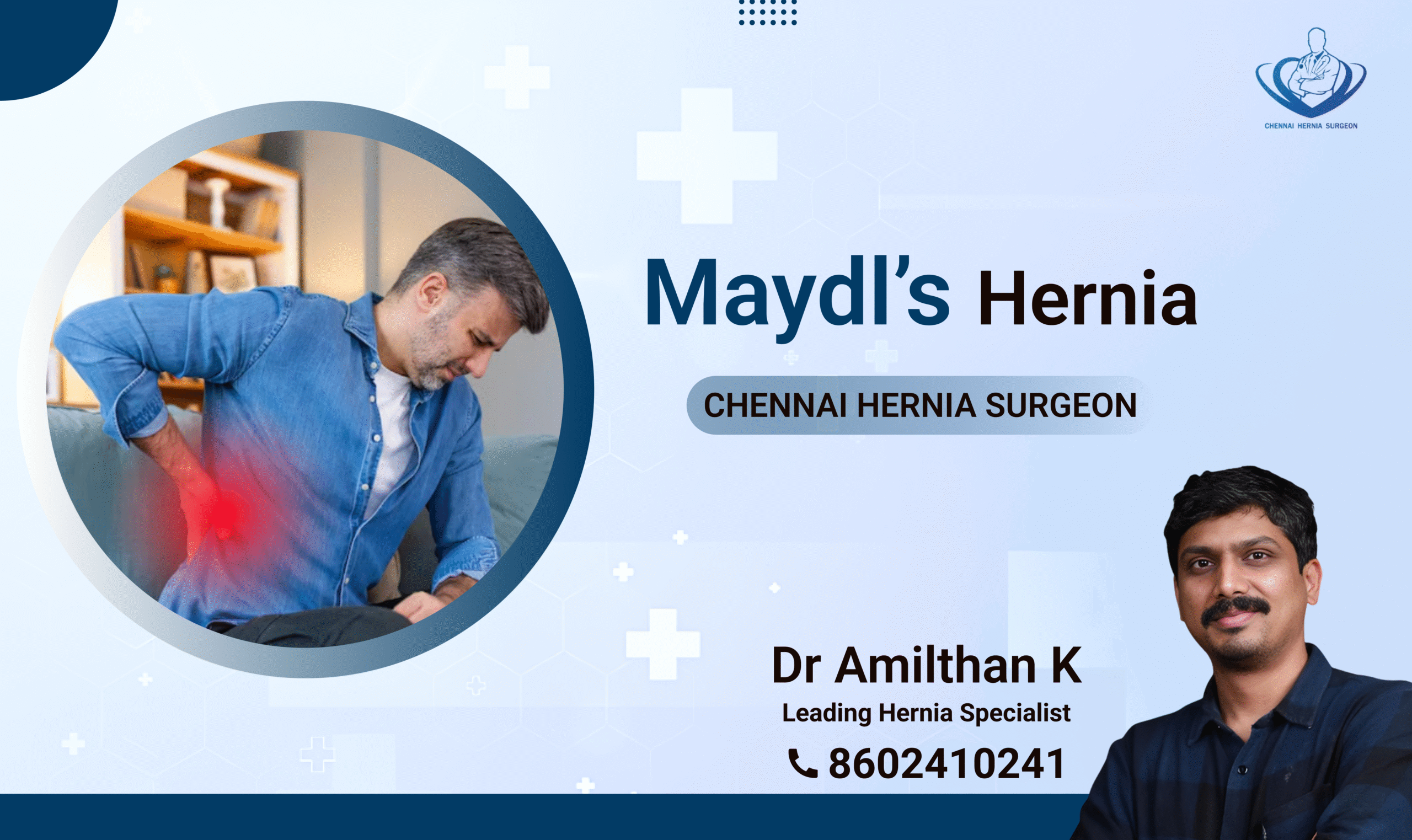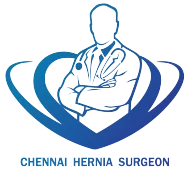Hernia is one of the most common health conditions in India, affecting over 15–20% of the population, both men and women. A study also found that Indians are more prone to hernias than Westerners as we have genetically lesser muscle mass than them.
In such cases, it is necessary for us to understand what a hernia is and learn all about its causes, symptoms, types, treatment methods, etc. This article gives you all the details you need to know about hernias. Use this for your reference and treat it when it is in the early stages.
Table of Contents
ToggleWhat is Hernia?
A hernia is the abnormal protrusion of an organ or part of an organ through a defect or weakness in the surrounding muscular wall. Hernias may be symptomatic or asymptomatic.
They usually appear as a lump that is poking out of your body, and a surgical intervention is required to treat it.
What are the Types of Hernias?
There are several types of hernias, each classified based on the location of the hernia sac and its position in the body. Diagnosing a hernia helps confirm its type. Some common types of hernias are listed below.
Ventral hernias
The term ventral comes from the Latin word “venter,” meaning “belly”. Any hernia located in the ventral position (front) of the human body, like the chest and abdomen, comes under ventral hernia.
Epigastric hernia
An epigastric hernia is when a part of your intestine pushes through the abdominal muscles present between your belly button and chest. This hernia occurs in the epigastrium hence, it is named epigastric hernia.
Lumbar hernia
Lumbar hernia is more common in men and is more likely to surface on the right side. It happens when the intraperitoneal and extraperitoneal contents push through the posteriolateral abdominal wall.
Umbilical hernia
An umbilical hernia occurs when a loop of the intestine pushes through a weak muscle structure near the navel (belly button). It is often congenital and has been present since birth.
Incisional hernia
An incisional hernia occurs when an organ pushes through the weak muscle structure around the area of a previous incision.
Spigelian hernia
A Spigelian hernia occurs when an organ pushes through a defect or weakness in the Spigelian fascia. This type of hernia is very rare and can become complicated if not treated for a long time. Due to its location and potential for complications, Spigelian hernia repair is often recommended by surgeons to prevent further issues and alleviate symptoms.
Inguinal hernias
An inguinal hernia occurs in the abdomen when an organ or part of the organ pushes through the weak abdominal muscles around it.
Direct inguinal hernia
A direct inguinal hernia is when the hernia appears in the posterior wall of the inguinal hernia.
Indirect inguinal hernia
In an indirect inguinal hernia, the hernia sac passes through the inguinal canal or the groin.
Sliding hernia
A sliding hernia happens when the retroperitoneal organs push through a defect in the surrounding abdominal wall. It can be either direct or indirect inguinal hernia. Here, the organ “slides” down the weak muscle structure and enters the inguinal canal.
Femoral hernia
A femoral hernia occurs near the thigh or groin areas and is more common in women. Here, the organs push through the abdominal muscles located in the lower abdomen near the femoral canal.
Hiatal hernia
A hiatal hernia occurs when an organ pushes through a defect in the diaphragm and enters the chest cavity. The diaphragm is a thin muscle structure separating the chest and the abdomen.
Congenital diaphragmatic hernia
A congenital diaphragmatic hernia occurs when the newborn baby has a hole in the diaphragm, and the surrounding organs push through it and enter the chest cavity.
What are the causes of Hernia?
1. Muscle weakness
- Congenital weakness
- Weakness due to aging
- Trauma
- Multiple pregnancies
- Previous surgery
2. Chronic cough
3. Obesity
4. Heavy lifting
What are the symptoms of Hernia?
- Visible lumps that appear when you do a physical activity like lifting objects, coughing, straining, etc.
- Pain or discomfort in the affected area.
- Pain that worsens when you strain or lift heavy weights.
- Weakness or pressure in the affected area.
- Occasional swelling or pain around the testicles when the intestine or hernia sac descends into the scrotum.
How to prevent Hernia?
It is essential to know how to prevent Hernia
- Avoid lifting heavy weights
- Maintain a healthy weight (BMI)
- Avoid straining during bowel movements
- Reduce constipation
- Eat foods with high fiber content
- Drink plenty of water
Treatments for Hernia?
Hernia treatment is given based on the condition of your hernia and the treatment method you prefer to undergo. Some hernias are mild and can be pushed back into place without surgery.
If the condition is serious, you might have to undergo surgical procedures to prevent the hernia from causing further complications. Below are some common surgical procedures performed to treat hernia.
- Herniotomy surgery (removing the hernia sac only)
- Herniorrhaphy (herniotomy along with posterior wall repair)
- Hernioplasty (herniotomy followed by posterior wall reinforcement with a synthetic mesh)
- Laparoscopic mesh repair
How to choose a Hernia Surgeon?
Choosing the right hernia surgeon for you is very important to get the best treatment and prevent any further complications from arising, it is essential to know which doctor to consult for Hernia. Here are some factors you need to consider before choosing a hernia surgeon to treat your issue.
- Check the experience of the doctor and how many successful hernia surgeries they have performed so far.
- Check the hospital and the doctor’s reputation.
- Check if the hospital has advanced technology equipment to give you the best treatment.
- Check their reviews and see what their past patients say about their experience with the doctor.
Conclusion
A hernia is a common occurrence and happens in many men and women. Don’t worry too much if you feel like you have a hernia. They are mostly not very serious and can be treated with minor surgery.
Dr. K. Amilthan MBBS., MS., FMAS., FALS.
Heal Your Hernia Now:
- 15+ Years of Experience
- 3,000+ Surgeries
Your Journey to Wellness Begins with us.
FAQ's
- Take the prescribed medicines on time
- Avoid lifting heavy objects
- Maintain a healthy diet
- Do not smoke
- Lose weight if you are obese or overweight
Generally, excess pressure on an organ or your intestines is the main cause of hernia. A hernia arises when this pressure occurs in the same region where you have a weak muscle, and the organ pushes through it.
Yes, regular exercise and staying physically active have been proven to reduce the chances of hernia. Chances of hernias are also high in people who are physically inactive and lead a sedentary lifestyle.

Dr. Amilthan
Dr. Amilthan is a renowned laparoscopic hernia surgeon based in Chennai, with over 15+ years of experience in general surgery. He completed his MBBS and MS in General Surgery at Kilpauk Medical College and Government Royapettah Hospital in Chennai.
- All Posts
- Hernia Blog

Which Doctor should you consult for Hernia? You can Consult a general surgeon or a hernia specialist for evaluation and...

A hernia occurs when an organ or any other part of your body pushes through the muscle and surrounding tissue...

An inguinal hernia occurs when the organs push through and bulge against the weak muscles of the abdomen. An effective...

